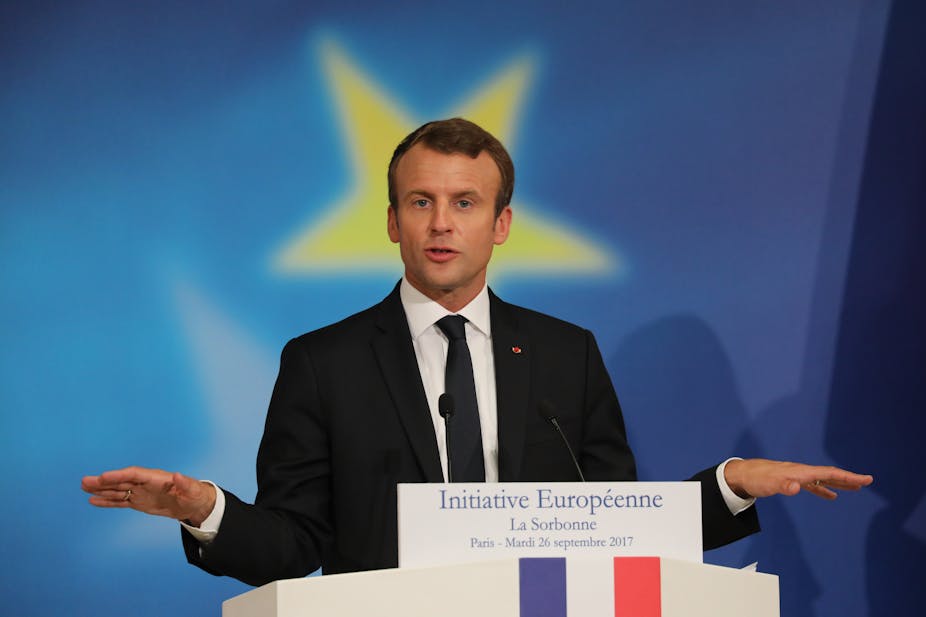“I like to believe that, in politics as in all things, what is true and truly good can only be found in a happy medium”. So said Victor Cousin, a 19th-century French philosopher and statesman. The thinker professed to be working to reconcile the epistemological, ideological and socio-cultural camps of his time by placing himself right in the centre of it all.
His words might easily be ascribed to a modern leader, though – the French president, Emmanuel Macron. A full six months into his presidency, the question of his actual political positioning remains a matter of debate. Macron also speaks of achieving a “happy medium”, implying that the various interests represented within the political world are being given equal value and weight. He wants to strike a balance between [liberty – which he takes to be a prime value of the political right – and equality – which he sees as the left’s prime value. But can centrism ever be a reality in politics?

Cousin’s enterprise had many detractors. Some saw his work as an unconvincing attempt at legitimising the existing, unequal state of things in France under the false pretence of compromise. The July Monarchy of 1830-1848, in which Cousin ended up playing a crucial part, claimed to be governing from a middle ground. It was the happy medium between monarchy and democracy, left and right, the rights of employers and those of workers. In practice, it was empowering the emerging bourgeoisie and banking system and was countering the working classes’ attempts to make their own situation fairer by repressing strikes and demonstrations and denying them full political rights.
Cousin secured the symbolic power of the bourgeoisie by linking selfhood with property. In his “common sense” logic (inspired by the Scottish school of the same name), selfhood implied freedom and responsibility, which in turn implied willpower. The mark of willpower was appropriation, which made property the sign of a strong, self-possessed self. This served, by an interesting rhetorical turn, to validate the existing socio-economic hierarchy. Wealth only happened to the right people. François Guizot, Cousin’s contemporary and colleague, gave a telling answer to whoever demanded more rights or recognition: “Get rich.”
En Marche towards trouble
Macron’s early speeches, like Cousin’s, were met with considerable fervour. This was before he was actually in charge of anything. Like Cousin, he has stated numerous times that he seeks a compromise between left and right. And, also like Cousin, he is putting forward “common sense” arguments to justify policies which arguably only work for certain parts of society.
The president’s general discourse on reform presents change as inevitable – and inevitably neoliberal. The idea is not to appeal to the social conscience of the highest earners by making them pay higher tax, but to go along with their acquisitiveness, lest France should keep on losing their “talent”. So new labour laws are being introduced that would make it easier for employers to lay people off, and allow them to pay less in cases of disputes with former employees.
Macron is also replacing the solidarity tax on wealth – which introduced an element of redistribution through the taxation of all possessions whose sum total exceeded a certain amount – with a tax applying solely to real estate, designed to encourage the wealthy not to take their investments abroad.
Contrast this with the president’s characterisation of those who refuse to go along with the reforms as “lazy”, and to his passing remarks on “those who succeed and those who are nothing”, and you have your Cousinian equation between property and individual worth.
Meanwhile, housing benefits are being cut and civil servants feel that they are increasingly being presented as an unnecessary burden on the government’s budget. Macron’s main rhetorical trick, here, is to suggest that the only route to social justice is paradoxically that of deregulation, through the fabled and controversial “trickle down” theory. He has used the image of leading rock climbers helping others to climb social echelons; helping the rich get richer means that they can, in turn, help others get richer – or less poor – too.
Notwithstanding Macron’s actual intentions, one may argue, here, with the French historian René Rémond, that “politics is not geometry”. What may seem a “happy medium” is bound to merely validate the current unbalanced scales, unless the imbalance is acknowledged and made up for. French philosopher Pierre Leroux’s reproach to Cousin may soon prove applicable to Macron: “You have moulded your philosophy on the state of things as they were; things have remained the same.” They may still get worse for some.

